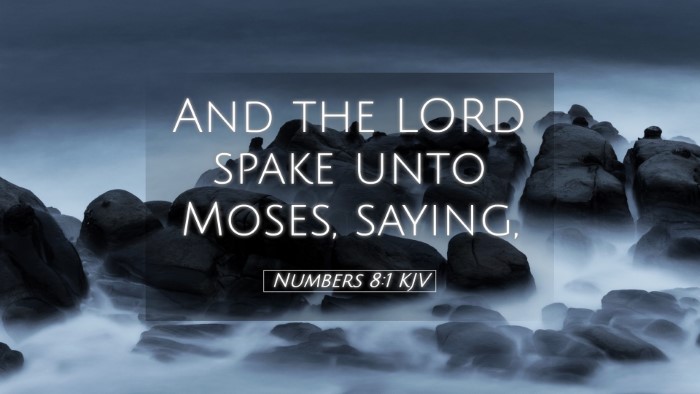Commentary on Numbers 8:1
Bible Verse: "And the LORD spake unto Moses, saying," (Numbers 8:1, KJV)
Introduction
This verse serves as a significant introduction to the instructions that follow regarding the duties of the Levites and the establishment of their role in the service of the tabernacle. This moment reflects God's direct communication with Moses, reinforcing the divine authority and the importance of the priestly duties which are to be carried out by the Levites. Such communication underscores the covenantal relationship between God and Israel.
Divine Instruction and Authority
The phrase "And the LORD spake unto Moses" highlights God's ongoing direction of the Israelites through the leadership of Moses. This reaffirms the concept that God's communication is vital for guidance and that Moses acted as a mediator between God and the people.
- Matthew Henry remarks that God’s address to Moses signifies the importance of His directives, which should be carefully adhered to by His people. He emphasizes that the instruction signifies God's presence and involvement in the affairs of Israel.
- Albert Barnes highlights that this is an important reminder that the establishment of the Levites' roles is divinely instituted. He states that such divine instructions set apart the sacredness of their duties and the significance of obedience to God's will.
- Adam Clarke elaborates on the significance of God speaking directly to Moses, suggesting that it exemplifies the notion of divine order within the community and the necessity of prophetic guidance in religious worship.
Contextual Significance
Numbers chapter 8 is positioned within the narrative of the Israelites' journey through the wilderness after their liberation from Egypt. The detailed instructions set forth in this chapter are pivotal for understanding the Levitical priesthood’s establishment and function.
The Role of the Levites
The Levites were set apart for work in the tabernacle, designated to carry out responsibilities that were crucial for maintaining the sanctity of worship. The importance of this role cannot be overstated, as it represents a direct link between the people and God.
- Matthew Henry points out that the Levites were chosen to serve as a gift to the priests, emphasizing their collaborative role in sustaining worship and preserving the holiness of the sanctuary.
- Albert Barnes notes that this preparation and consecration affirmed the necessity for ritual purity and the significance of dedicated service to God among His people, serving as a model for future generations.
- Adam Clarke adds that the presence of the Levites as a tribe is pivotal to God's order in worship, showcasing how God structures His relationship with His people through service and allegiance.
Theological Implications
This verse opens up a multitude of theological reflections. It emphasizes the following key themes:
- The Nature of God’s Communication: The directness of God’s speech to Moses illustrates a God who is engaged and desires to communicate His will clearly.
- Service and Community: The establishment of specific roles within the community reflects God's desire for order and service among His followers. The Levites’ roles serve to remind us of the importance of dedicated service in the Christian community today.
- The Importance of Obedience: The necessity to heed God's directives remains a timeless message. This verse serves as a reminder that obedience to divine instruction is fundamental to maintaining a right relationship with God.
- Mediator Role: Moses' position as the mediator between God and Israel illustrates Christ's role as our ultimate mediator. Jesus fulfills what Moses served to foreshadow, indicating God's continuous provision for communication between Himself and His people.
Conclusion
Numbers 8:1 serves as a vital entry point into understanding the Levitical system and the role of divine communication in guiding the community of Israel. The direct engagement of God with Moses sets a precedent for how God desires to operate within His people's lives. Pastors, students, theologians, and Bible scholars can draw from this passage insights about the nature of God's authority, the importance of obedient service, and the structure of worship that connects the faithful community to its Creator.


